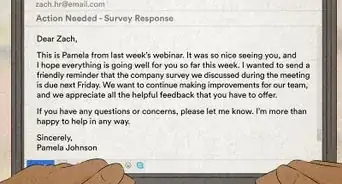This article was co-authored by Klare Heston, LCSW. Klare Heston is a Licensed Independent Clinical Social Worker based in Cleveland, Ohio. With experience in academic counseling and clinical supervision, Klare received her Master of Social Work from the Virginia Commonwealth University in 1983. She also holds a 2-Year Post-Graduate Certificate from the Gestalt Institute of Cleveland, as well as certification in Family Therapy, Supervision, Mediation, and Trauma Recovery and Treatment (EMDR).
There are 8 references cited in this article, which can be found at the bottom of the page.
This article has been viewed 26,117 times.
A flirtatious remark from your friend's spouse may take you off guard. It may make you feel awkward or uneasy about what to do, and whether to tell your friend. Make it clear to your friend's spouse that you are not interested, but remain calm and respectful if possible. Depending on the spouse's behaviors and remarks towards you, it may be best to notify your friend of what happened. If you do decide to tell, focus on having the facts and talking in private, so that your friend is less likely to feel judged.
Steps
Responding to Flirtation from Your Friend's Spouse
-
1Decline their advances. If the person is married, and particularly if the person is your friend's spouse, you need to draw the line on their flirtations. Make sure to quickly and directly shut down their advances. While it may feel good have others hit on you, avoid getting that attention from your friend's spouse. You don't have to lecture or criticize them, but do be direct and clear. For example, say, "No, I'm not interested."
-
1
- If they're physically approaching you, create physical space between you and them. Switch chairs if they're coming to sit next to you, or walk to a different area of the room.
- If they try to touch you, move their hand and say "Excuse me. I'm not interested."
- If you think they're flirting but aren't sure, consider saying, "Not sure if I'm misinterpreting this, but it feels like you're hitting on me and I'm not interested."
-
2Remind them that you are friends with their significant other. If they seem to be undeterred by your decline, and they continue to hit on you, make it clear that you are good friends with their spouse. This can help them to understand that you value your friendship more.
- If they don't know you well, explain how you know their spouse. Make it clear that there would be serious repercussions if they continue to flirt.
- If they know that you're friends, explain how long or close your relationship is with their spouse.
- Consider saying things like, "You know I've known your spouse for three years. Our offices are just a few doors down from each other. She's a great person."
-
3Be calm but direct. While you may feel awkward, creeped out, or uneasy after being hit on by your friend's spouse, focus on remaining calm. Just make sure that your words and actions make it clear that you're not interested.[2]
- Avoid getting too anxious or upset with your friend's spouse, unless they are sexually harassing or touching you inappropriately. If so, say, "Stop. That's really inappropriate."
- Most likely they will make a comment or move that is suggestive rather than direct. Be calm and direct in your response back.
- If they say that they're making a joke, then say, "That's not very funny."
- Avoid smiling, touching, or flirting back when they hit on you. This may suggest that you are giving mixed signals.
Assessing the Severity of the Flirtation
-
1Evaluate if this is a mild flirtation. Does your friend's spouse seem to be a flirtatious person, and enjoys complimenting others regularly? It may feel awkward, but this might just be the nature of their behavior to most people. Consider how "hitting on someone" can mean different things to different people.
- Pay attention to their actions around others. Do they seem flirtatious when they're in public? If so, they might not mean anything by it.
- See if the spouse seems to hang around you more than your friend. If they usually stick close to your friend, there may be less need to worry.
-
2Assess if the spouse's flirtations are more obviously directed at you. Do their actions seem squarely directed at you? They may want to find ways to be near you and talk with you more exclusively. Be aware not just of their words, but their body language.[3]
- For example, does the spouse seem to hang on your every word? Do they find ways to touch your shoulder, hands, or legs? This may be a more worrisome encounter.
- If there are other people present when the spouse hits on you, consider asking them whether it seemed like a come-on.
-
3Evaluate if their actions are harassment. Does the spouse make you feel uncomfortable when they are around you? Are they blunt and direct in their suggestion that they want to sleep with you or that they find you sexually appealing? Any unwanted sexual behavior that pressures you can be considered harassment.[4]
- Notice their words or body language. If their words are graphic, vulgar, or very blunt, this could more likely be harassment if it makes you feel uneasy, intimidated, and offended.
- Consider whether this a sudden attempt or if it has it been building for some time. If they keep trying to get away with more and more, it may be harassment.
- Do they suggest that they want to touch you in your private areas? This could also be a sign of harassment.
- Sexual harassment is more about control and power. The spouse may feel like they can get away with certain unwelcome comments or actions.
-
4Determine if this interaction merits notifying your friend. Depending on what transpired and what the actual remarks were, you may or may not want to tell your friend about what happened. If the situation made you feel very uncomfortable, and makes you question your friend's relationship with their spouse, it may help to lessen your anxiety if you talk with your friend.[5]
- If your friend's spouse put their hand on you and told you, "I find you very attractive," this is a clear implication that they are willing to act on their flirtation.
- On the other hand, if it's more suggestive and without any touching, like they said, "You look nice in that dress," you may be less inclined to ruffle feathers.
-
5Watch how your friend's spouse interacts with others. If you're at a dinner party for example, there may be opportunities to watch what your friend's spouse does with other people there. This may give you hints about their personality, and their actions around others they may be attracted to. If you have known your friend and their spouse for a long time, it may be a different approach.[6]
- If your friend's spouse has shown an interest in you just for an evening, and that's all, it may not be something to question or be anxious about with your friend.
- If your friend's spouse has a history of showing interest in other people, they may have a wandering eye, and may be more likely to cheat.
- Think about your past and current interactions with the spouse. If their personality and actions make you feel uneasy, it may be worthwhile to let your friend know.
Deciding to Tell Your Friend What Happened
-
1Have the facts on hand about what happened. If and when you decide to talk with your friend about their spouse hitting on you, make sure to come with some facts handy, rather than general statements that are filled with emotion only. This can help to provide clear details to your friend about what to do next.[7]
- Give your friend the basics, like when it occurred, who was present, and what was said or done.
- Try to keep the situation clear and simple without providing exaggerated or highly emotional details, even if the situation was upsetting for you.
-
2Tell your friend in private. Avoid turning the situation into gossip. Make the situation known to your friend in private without others present. This helps your friend to "save face" and be less in the spotlight of the situation.
- Whether or not you decide to tell your friend, avoid talking first with other friends or other people who are likely to gossip or share this information inadvertently.
- Allow for privacy on something as sensitive as a spouse's indiscretions. This could lead to spousal conflict among your friend and their spouse, so it's a delicate matter.
- Realize that your friend may not react well to this conversation. They may become defensive, upset, or angry. However, that doesn't mean you shouldn't tell them.
-
3Ask if your friend is concerned about their spouse's flirtatious behaviors. Learn if your friend has been concerned in the past or present about their spouse, their flirtatious behaviors, or their possible indiscretions. If they have confided in you that their spouse has cheated or shown interest in other men or women, or that they're very flirtatious with others, this may help you to understand your friend's perspective.[8]
- After your friend opens to you, ask if they would want to know if their spouse hit on you or another friend.
- If they seem defensive or say no, this may be a sign that they are not ready to talk about what happened when their spouse hit on you.
-
4Be supportive to your friend. As a friend, it's important to be supportive, caring, and understanding to someone whose spouse is acting inappropriately. See this situation as an opportunity to be helpful to your friend, and try to prevent awkward interactions from happening in the future.[9]
- Listen to what is bothering your friend about their spouse and their life in general.
- If you are very concerned about their marriage, ask whether the friend and their spouse have open and honest communication about their needs and frustrations.
- If the friend seems to have difficulty with communicating with their spouse, this may be a matter of finding help for their marriage.
- Reassure your friend that you have no intention of being with their spouse, and that you don't want what happened to affect your friendship.
References
- ↑ https://www.psychologytoday.com/blog/fulfillment-any-age/201601/when-someone-flirts-or-more-your-partner
- ↑ http://www.chicagotribune.com/lifestyles/sc-social-graces-friend-flirting-with-your-partner-20160708-story.html
- ↑ http://www.evanmarckatz.com/blog/marriage/how-can-i-stay-married-to-a-man-who-flirts-with-other-women/
- ↑ http://www.un.org/womenwatch/osagi/pdf/whatissh.pdf
- ↑ http://www.nytimes.com/2015/11/15/magazine/should-i-tell-my-friends-husband-that-shes-having-an-affair.html
- ↑ https://pairedlife.com/problems/Profile-of-the-Other-Woman-Why-Your-Man-Finds-Her-Irrisistible
- ↑ http://www.evanmarckatz.com/blog/marriage/how-can-i-stay-married-to-a-man-who-flirts-with-other-women/
- ↑ https://www.theguardian.com/lifeandstyle/2015/may/15/my-husband-constantly-phones-and-texts-another-woman
- ↑ http://www.huffingtonpost.com/shasta-nelson-mdiv/cheating-tell-a-friend_b_1665757.html







































































